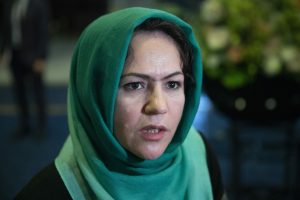On Friday afternoon, one of the few female members of the Afghan government team tasked with negotiating with the Taliban was attacked as she returned to the Afghan capital, Kabul. The Taliban denied responsibility for the attack, which comes at the cusp of long-anticipated intra-Afghan peace talks.
Fawzia Koofi, a former parliamentarian and women’s rights activist, was reportedly shot in the arm while traveling back to Kabul with her sister after attending a meeting in Parwan province. While her injuries were not life-threatening, the apparent assassination attempt underscores continued insecurity in Afghanistan as well as the precarious place of women in the peace process.
Koofi is one of just five women included in the Afghan government’s 21-member team tasked with talking to the Taliban. The paltry number of women included drew criticism. “Can these few women represent all Afghan women and carry their voices? Why not aim for a 50% women participation in the negotiation with the Taliban?” Shahira Mohseni wrote in an op-ed published by Khaama Press. At The Diplomat, Fatema Jafari and John A. Lechner noted that “Women will have seats at the approaching intra-Afghan dialogue. But tokenization is a significant threat.”
Afghan politicians strongly condemned the attack on Koofi. The head of the negotiation team, Mohammad Masoom Stanekzai, tweeted about the attack, noting that Koofi was in good health. President Ashraf Ghani called the attack “cowardly” and Abdullah Abdullah, now chairman of the High Council for National Reconciliation, termed it an “assassination attempt” and called on the government to “to identify and apprehend the culprits and possible motive for the attack.”
The attack took place on the Kabul-Parwan Highway in Qarabagh district in the northern edge of Kabul. According to a TOLO News report, Koofi said the Afghan government should not neglect the investigation into who was behind the attack.
“I think that spoilers of the peace process and those who have enmity with stability and prosperity in Afghanistan — and especially against women — are targeting any women who are active,” Koofi said, per TOLO News’ report.
With talks anticipated to begin soon, the timing of the attack on Koofi casts a shadow and amplifies concerns about what the next phase of political life for Afghanistan means for Afghan women.
As Ruchi Kumar reported for The Guardian, “Many women fear that freedoms gained in the 20 years since the fall of the Taliban will be sacrificed in the talks.”
According to the Associated Press, talks could begin as soon as August 20 and are expected to take place in Qatar, where the Taliban has a political office.
A February 29 deal between the United States and the Taliban paved the way for intra-Afghan talks with prisoner releases, but left the Afghan government out of that phase of talks. Women were also not mentioned in the deal.
The Taliban have long avoided dealing directly with the government in Kabul, positioning the Afghan government as a puppet of foreign powers. The upcoming talks will mark a significant shift, but it’s unclear what happens next.
The Taliban government of the 1990s was extremely repressive, forcing women to wear burqas in public and barring them from most workplaces. Whether the Taliban have changed their tune on women is a topic of long debate. An even more serious debate is whether a change in tune and tone will translate to actual policy if the Taliban become a part of mainstream Afghan politics.
Last summer, the New York Times put together a report under the title “The Taliban Promise to Protect Women. Here’s Why Women Don’t Believe Them.” In that report, Hawa Nuristani — who along with Koofi was the only other woman included in a delegation that traveled to Moscow to meet with Taliban leaders in February 2019 — said that the Taliban froze up when pressed for specifics on how the Taliban would honor the rights of women:
She recalled them saying that women were too “sympathetic and delicate” for jobs like commissioner or mayor, where “a woman’s emotions might get in the way.”
All sides are pressing ahead with intra-Afghan talks now. U.S. Special Representative for Afghanistan Reconciliation Zalmay Khalilzad tweeted on Friday: “I call on all sides who seek peace to not only condemn the attack but to accelerate the peace process and start intra-Afghan negotiations as soon as possible.”

































